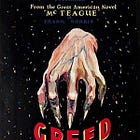Kroger Testifies It Jacked Up Egg And Milk Prices Beyond Inflation. Hope It Doesn't Go To Antitrust Jail!
Someone fetch my fainting salts.

The Kroger-Albertsons antitrust trial started earlier this week, and so far it’s not looking great for their proposed corporate merger.
Should you need a refresher, in October of 2022, the Kroger grocery chain generously offered to buy the Albertsons grocery chain for $25 billion, a move that would impact consumers across the nation. Kroger is already the largest traditional grocery chain in the US, owning about 10.7 percent of American supermarkets under a variety of different names so that people can still pretend that their hometown supermarket is still their hometown supermarket and not some gross, impersonal conglomerate. Were they to buy Albertsons, that share would rise to about 13 percent.
Is that good for consumers? Lord no. The more of the market Kroger controls, the less competition it has and the less incentive to keep prices low. Is it good for workers? Not even remotely. Is it good for stockholders and corporate executives? Sure is! Except, I imagine, for the ones who get let go because “redundancy.”
One very important revelation so far is that — surprise! — a Kroger executive in charge of pricing testified that the chain absolutely did charge consumers more for eggs and milk than “inflation” required them to do. This hardly comes as a surprise, as executives have been bragging for years at this point about how they’ve used inflation as an excuse to jack up prices for consumers.
Via Bloomberg:
In a March email to his bosses, Andy Groff, Kroger’s senior director for pricing, acknowledged that the company had raised its prices more than required to adjust for higher costs.
“On milk and eggs, retail inflation has been significantly higher than cost inflation,” Groff wrote. […]
The company’s goal is to “pass through our inflation to consumers,” Groff said in response to questions about his email.
Well, they certainly did that, and more.
“We look at Jewel, Walmart and Meijer. We focus against Jewel,” another Kroger executive wrote in an email to Marx that recommended Mariano’s maintain its prices. The next month, Walmart and Meijer were lowering prices by 32 cents for a package of 18 eggs, while Jewel was dropping its price 20 cents to beat Mariano’s. “Please match Jewel,” Marx wrote to his colleagues.
The Jewel, for the record, is also very expensive!
But to be clear — these prices are not based on actual inflation that they need to pass on to consumers for their own survival and to continue paying their workers, but rather on what they think they can get away with.
They’re also aware that people don’t always have the time or inclination to keep track of how much eggs cost everywhere or will still buy their overpriced eggs out of convenience. I am well aware that eggs (and most other things) cost less at Trader Joe’s or Fresh Thyme and other places, and will take a bus there when I can … but in most cases I’m just gonna run to Mariano’s because it’s less than a block away.
Groff denied this in his testimony, saying that they wouldn’t change their “pricing strategy” because “we would lose customers. There’s no doubt in my mind that would happen.” That sounds so reasonable, except for how Jewel is actually owned by Albertsons, so they would only be price matching themselves in that case. It’s genius!
Consumers deserve to have a choice and humans deserve to have affordable food, so hopefully the FTC will win this one.
PREVIOUSLY ON WONKETTE!:






Kroger raised the prices and Biden got the blame. The perfect crime, if you’re a corporate pig.
Remember when there was ONE phone company?
I do and FUCK THAT.